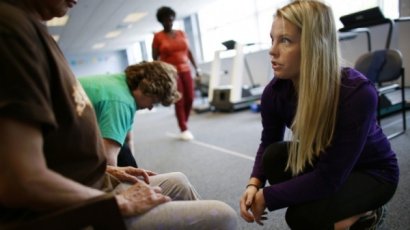In general, falls are considered a normal part of the aging process. This is likely due to the alarming rates of falls in adults over 65 years of age, with close to 35% of older persons falling within a given year. For many older persons, suffering a fall and the possibility of injury and restriction of activity that may follow is a significant concern. The consequences of suffering a fall extend beyond just physical injuries. Many people who fall can develop a fear of falling, leading them to reduce their daily activities. This strategy, though initially effective, ultimately leads to deconditioning and subsequent increased risk of falling in the long term.
Startling Facts About Falls:
- Every 18 seconds, a person is treated in an emergency room for a fall
- Every 35 minutes a senior dies following a fall
- One-third of older individuals suffer a fall at least once a year
- Less than half talk to their healthcare providers
- Over 90% of all hip fractures are related to falls
- The CDC reports that 1-in-5 falls result in a serious injury such as a broken bone or head injury
- Falls are the most common cause of TBI (traumatic brain injury)
- Falls are the leading cause on injury-related death and hospitalization
- 2.3 million nonfatal fall injuries among older adults aged over 65 years were treated in emergency departments
- More than 662,000 of these patients were hospitalized
The Cost of Falling:
Falls are expensive - each year about $50 billion is spent on non-fatal fall injuries and $754 million is spent on falls which result in fatalities.
- In Virginia, the total cost of falls in 2014 was reported to be $849,000,000
- On average, the hospitalization cost for a fall injury is $34,294 (in 2012 dollars).
- Medicare costs per fall average between $13,797 and $20,450 (in 2012 dollars).
- In a study of people age 72 and older, the average health care cost of a fall injury totaled $19,440
Contact Us
Need additional information about Monarch Balance for Life? Contact us via email or call at 757-683-6757.



